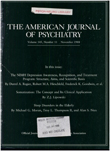Dexamethasone suppression tests in patients with obsessive-compulsive disorder
Abstract
Obsessive-compulsive disorder and major depressive disorder are associated by several lines of evidence. To explore the possible relationship between the two disorders, the authors administered 1-mg dexamethasone suppression tests to 18 patients with obsessive- compulsive disorder and 51 patients with major depressive disorder. None of the obsessive-compulsive patients were classified as nonsuppressors on the basis of a 4:00 p.m. serum cortisol level, whereas 37% of the depressed patients were nonsuppressors. The mean cortisol levels of the two groups differed significantly. Factors that may influence hypothalamic-pituitary-adrenal function, such as age, depressive symptoms, and severity of illness, are discussed in light of these results.
Access content
To read the fulltext, please use one of the options below to sign in or purchase access.- Personal login
- Institutional Login
- Sign in via OpenAthens
- Register for access
-
Please login/register if you wish to pair your device and check access availability.
Not a subscriber?
PsychiatryOnline subscription options offer access to the DSM-5 library, books, journals, CME, and patient resources. This all-in-one virtual library provides psychiatrists and mental health professionals with key resources for diagnosis, treatment, research, and professional development.
Need more help? PsychiatryOnline Customer Service may be reached by emailing [email protected] or by calling 800-368-5777 (in the U.S.) or 703-907-7322 (outside the U.S.).



